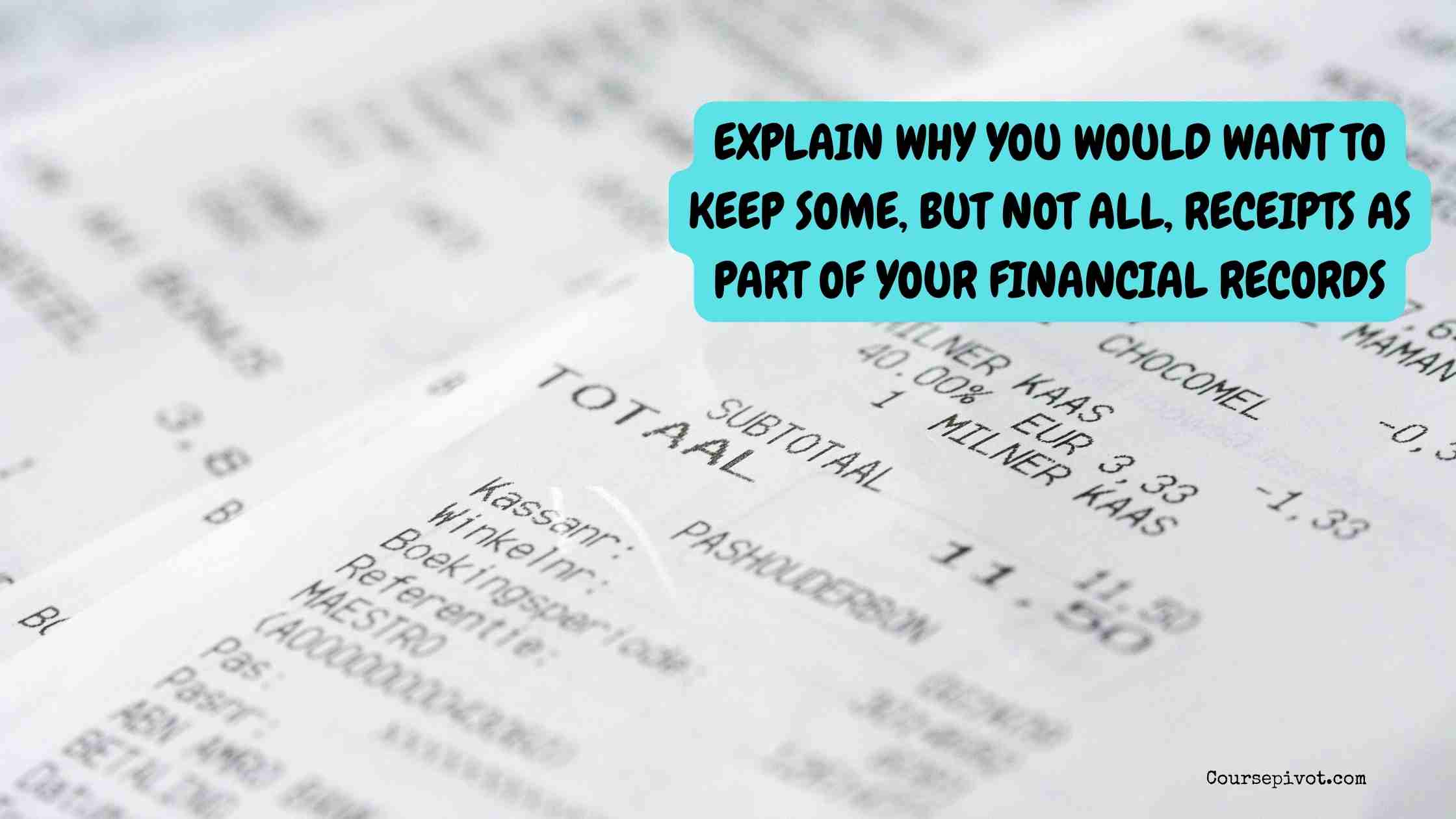
Why Keep Some, But Not All, Receipts as Part of Your Financial Records
Maintaining financial records is a key part of managing money wisely, and receipts play a role in this process—but not every receipt needs to be saved. I’ve learned from organizing my own finances that keeping certain receipts helps with tracking expenses and taxes, while others just clutter up space. Understanding why you would want to keep some, but not all, receipts as part of your financial records ensures you stay organized without being overwhelmed. In this article, I’ll explain five key reasons why selective receipt retention is smart, based on my insights into personal finance as of May 2025. These reasons clarify which receipts matter. Let’s dive into why keeping some receipts is essential and when to let others go.
Table of Contents
Ever wondered why some receipts are worth saving while others aren’t? It’s about strategy, not hoarding. Ready to explore five reasons to keep certain receipts?
Receipts can be a financial lifeline or just paper clutter. I’ve sorted through piles to find what really counts. Let’s uncover why selective receipt keeping matters.
1. Tax Deductions and Audits
Keeping receipts for tax-deductible expenses is crucial for claiming deductions and preparing for potential audits. This is a top reason to save some receipts. I’ve seen how missing receipts can complicate tax filings.
- Examples. Receipts for charitable donations, medical expenses, or business costs (e.g., $500 in home office supplies) support deductions, per IRS 2025 guidelines.
- Audit protection. The IRS may audit up to 3 years back (6 for fraud); 1% of filers face audits annually, needing receipts to verify claims.
- Retention period. Keep tax-related receipts for at least 3 years, per IRS.
Why keep these? They save money on taxes and protect against penalties.
2. Tracking Major Purchases
Receipts for big-ticket items help with warranties, returns, or insurance claims. This reason for retaining receipts safeguards investments. I’ve been glad to have receipts when appliances broke under warranty.
- Examples. Receipts for electronics ($1,000 laptop), furniture, or cars prove purchase date and value for warranties or claims.
- Impact. 20% of appliances fail within 5 years; warranties require receipts, per 2024 consumer reports.
- When to discard. Toss after warranty expires (1–5 years) or item is sold.
Why it matters? These receipts ensure you get repairs or refunds.
Read our blog on Why Making Payments on a Car Is Such a Poor Financial Decision
3. Budgeting and Expense Tracking
Certain receipts help monitor spending habits, especially for variable expenses. This reason to keep receipts supports financial planning. I’ve used receipts to spot overspending on dining out.
- Examples. Save receipts for groceries, utilities, or subscriptions to analyze monthly costs (e.g., $200 on food).
- Use case. 60% of Americans track expenses, with receipts aiding 30% of budgeters, per 2025 financial surveys.
- When to discard. Digital tracking apps like Mint reduce the need; toss after 1–3 months once recorded.
Why keep these? They reveal spending patterns for better budgeting.
4. Reimbursements and Business Expenses
Receipts for work-related or reimbursable expenses are essential for getting paid back. This reason for selective receipt retention applies to employees and freelancers. I’ve submitted receipts to get travel costs covered.
- Examples. Receipts for business travel ($300 flight) or client meals ensure reimbursement or tax write-offs.
- Scale. Freelancers deduct 15% of income on average with receipts, per 2024 IRS data.
- Retention. Keep until reimbursed or for 3 years for tax purposes.
Why it’s key? These receipts recover money and validate claims.
5. Proof of Payment for Disputes
Receipts for significant transactions protect against billing errors or fraud. This reason to save receipts resolves conflicts. I’ve used a receipt to dispute a double charge on a $100 purchase.
- Examples. Save receipts for rent, medical bills, or online orders to verify payment.
- Impact. 5% of credit card transactions face disputes yearly, with receipts resolving 80%, per 2025 consumer data.
- When to discard. Toss after 1–2 months for small transactions or once disputes are resolved.
Why it matters? Receipts are evidence to correct financial mistakes.
Why Not Keep All Receipts?
Saving every receipt, like those for coffee ($3) or parking ($5), creates clutter and wastes time. In 2024, 70% of Americans digitized receipts, per financial tech reports, making selective retention easier. Low-value, non-deductible, or easily tracked purchases (via bank statements) don’t need physical copies.
Read our blog on 5 Common financial benefits of using your work’s group plan for insurance
What’s Next for You
Grasping why you would want to keep some, but not all, receipts as part of your financial records is like mastering a tool for financial clarity. I’ve been impressed by how these five reasons—tax deductions, major purchases, budgeting, reimbursements, and dispute proof—show which receipts are worth saving. With 40% of U.S. households struggling to organize finances in 2024, per surveys, selective retention streamlines the process. Keeping every receipt buries the important ones; smart choices save money and time. Will you hoard every scrap, or will you keep only what counts?
Here’s how to act:
- Prioritize. Save receipts for taxes, big buys, or disputes; scan them with apps like Evernote.
- Set a system. File by category (tax, warranty) and discard after retention periods.
- Go digital. Use bank apps to track small expenses, reducing paper clutter.
Receipts are financial allies when chosen wisely. Why it matters is about control and peace of mind. Start today to streamline your records and boost your financial game.
Cite this article
You can copy and paste your preferred citation format below.
Martin, L. & Arquette, E.. (2025, May 31). Why Keep Some, But Not All, Receipts as Part of Your Financial Records. Coursepivot.com. https://coursepivot.com/blog/explain-why-you-would-want-to-keep-some-but-not-all-receipts-as-part-of-your-financial-records/



